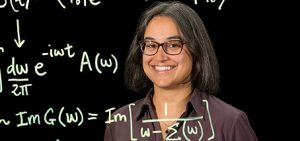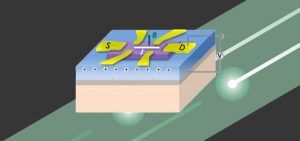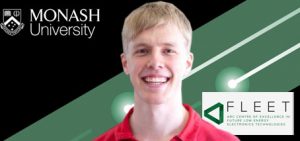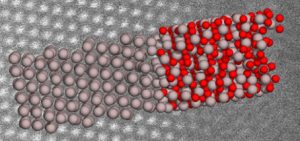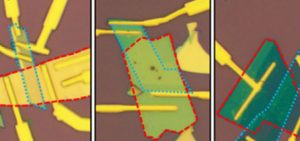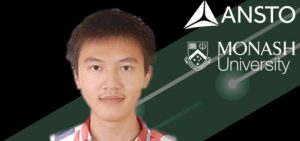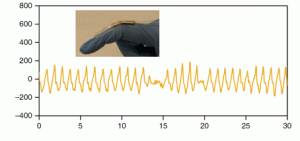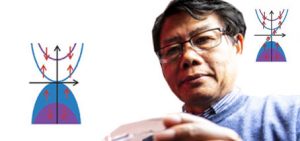Engage
See news from around FLEET, below
Catch up on all past issues of FLEET News newsletter
FLEET News
Coronavirus lockdowns have led to a massive reduction in global emissions, but there’s one area where energy usage is up – way up – during the pandemic: internet traffic. Data-intensive video streaming, gaming and livestreaming for business, university and school classes, is chewing up energy. Read more: Netflix has capitalized on social isolation, but will its success continue in a post-coronavirus world? Estimates can be notoriously difficult and depend on the electricity …
Mobile phones and other electronic devices made from an organic material that is thin, bendable and more powerful are now a step closer thanks to new research led by scientists at The Australian University (ANU). Lead researchers Dr Ankur Sharma and Associate Professor Larry Lu say it would help create the next generation of ultra-fast electronic chips, which promise to be much faster than current electronic chips we use. “Conventional devices run …
Congratulations to FLEET CI A/Prof Meera Parish who received an ARC Future Fellowship in this week’s announcement. “The revolution in electronics and the Information Age were enabled by powerful theories based on the concept of the quasiparticle, an object composed of many particles such as electrons,” writes A/Prof Parish. The new ARC Fellowship will support Meera’s work to unravel the …
Interlayer coupling in vdW material Fe3GeTe2 successfully increased by insertion of protons A Chinese-Australian collaboration has demonstrated for the first time that interlayer coupling in a van der Waals (vdW) material can be largely modulated by a protonic gate, which inject protons to devices from an ionic solid. The discovery opens the way to exciting new uses of vdW materials, …
As COVID bites into academic budgets, it is getting even harder for PhD students to secure funding. Research indicates COVID is disproportionately hurting women in science, who are already under-represented in STEM, particularly in physics. In response, FLEET has introduced a new, third scholarship option for outstanding candidates who identify as women: New PhD partial-stipend scholarship: Maximum $15,000/year partial stipend …
Congratulations to FLEET PhD student Matt Gebert, recognised for his dedication to science-outreach by the Monash Faculty of Science. Matt’s contributions to science outreach include running lab tours with Monash Tech School, demonstrating levitating superconductors and speaking at Monash University open day, teaching regional students via the Emerging Science Victoria program, coordinating PhD day, and in-class demos and talks, including …
A two-day live-streamed workshop brought 30 researchers from across FLEET together last week, organised by ANU Research Fellows Maciej Pieczarka and Eliezer Estrecho. FLEET’s second research theme uses a quantum state known as a superfluid to achieve electrical current flow with minimal wasted dissipation of energy. In a superfluid, scattering is prohibited by quantum statistics, and all particles flow with …
There’s more to glass than meets the eye. Glasses, which are disordered materials with no long-range chemical order, have some mysterious properties that have remained enigmatic for several decades. Amongst these are the anomalous vibrational states that contribute to the heat capacity at low temperature. Early researchers established that these states obey Bose-Einstein statistics, and the name stuck, so today …
Shooting for an all-online open day featuring FLEET’s material labs at Monash University’s New Horizons building, FLEET Research Fellow Dr Semonti Bhattacharyya with School of Physics and Astronomy Steve Morton. See the resulting video on Monash Physics youtube.
2D vdW TMD heterostructures studied Study correlates interface physics to device performance An India-Australian theoretical and experimental study for high-performance optoelectronics has been published in Nano Letters. The Monash University collaboration with the Indian Institute of Technology Bombay (IITB) designed and fabricated a heterostructure comprising two layered transition metal dichalcogenides (WSe2 and ReS2). Integrating new physics in vdW heterostructures Van-der-Waals …
Congratulations to FLEET PhD student Qile Li, whose excellent work in probing electronic structures of novel materials has been recognised by an award and scholarship from the Australian Institute of Nuclear Science and Engineering (AINSE). At ANSTO’s Australian Synchrotron, Qile Li uses Angle-Resolved Photo-Electron Spectroscopy (ARPES) to measure electronic properties of intrinsic magnetic topological insulators. Intrinsic magnetic topological insulators are …
Around 35 PhDs and other Early Career Researchers from FLEET and partner organisation the MacDiarmid Institute took a chance last week to learn how to take control of their future in these uncertain times, and to gain a better understanding of the job market (both in academia and industry) with a targeted, one-hour workshop from “the thesis whisperer”. A/Prof Inger …
Record output power obtained from piezoelectric, atomically-thin material Remarkable synthesis advance for materials such as tin-monosulfide (group IV monochalcogenides), which are predicted to exhibit strong piezoelectricity Potential materials for future wearable electronics and other motion-powered, energy-harvesting devices RMIT-UNSW collaboration applies liquid-metal synthesis to piezoelectrics, advancing future flexible, wearable electronics, and biosensors drawing their power from the body’s movements. Materials such …
Spin-gapless semiconductors (SGSs) are a new class of zero-gap materials, with fully spin polarized electrons and holes. SGSs bridge the zero-gap materials and half-metals Material’s fascinating spin and charge states hold great potential for future spintronic technology. A University of Wollongong team has published an extensive review of spin-gapless semiconductors (SGSs) . Spin gapless semiconductors (SGSs) are a new class …
FLEET CI Professor Kourosh Kalantar-zadeh (UNSW Sydney) has been awarded the prestigious 2020 Robert Boyle Prize for Analytical Science by The Royal Society of Chemistry. Prof Kalantar-zadeh is recognised for his significant influence across multiple fields of engineering. Contributions to society coming from his research across multiple disciplines include new innovative pollution sensors, transistors, medical devices and optical systems. Many …



